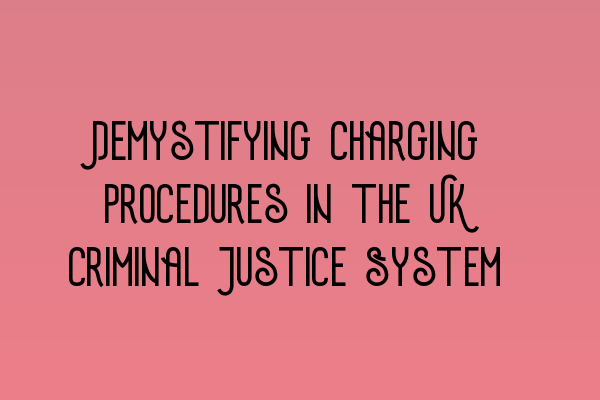Demystifying Charging Procedures in the UK Criminal Justice System
Welcome to the SQE Criminal Law & Practice UK blog! In this article, we will be unraveling the complexities of charging procedures in the UK criminal justice system.
Understanding the Charging Process
When a crime is committed, the first step in the legal process is the charging procedure. The charging procedure involves formalizing the accusation against the alleged offender and bringing them before the court. It is crucial to have a clear understanding of this process to ensure that justice is served.
The Importance of Proper Charging
Proper charging is vital to maintain the integrity of the criminal justice system. It ensures that individuals are not falsely accused of crimes they did not commit and that the legal rights of both the accused and the victims are protected during the criminal proceedings.
The Role of the Crown Prosecution Service (CPS)
The Crown Prosecution Service (CPS) is responsible for deciding whether charges should be brought against an individual. Their role involves carefully reviewing the evidence and determining if there is a realistic prospect of conviction. Understanding the CPS’s role in the charging procedure is essential for anyone involved in the criminal justice system.
Common Charging Procedures
There are several common charging procedures in the UK criminal justice system. Some of these include:
- Summary Offences
- Indictable Offences
- Either Way Offences
- Private Prosecutions
- Fixed Penalty Notices
Each type of charging procedure has its own unique characteristics and implications. Understanding the differences between them is crucial for legal professionals and those seeking justice.
The Role of Legal Professionals
Legal professionals, such as solicitors and barristers, play a vital role in ensuring that charging procedures are followed correctly. They provide expert advice, guide clients through the legal process, and ensure that their rights are protected.
If you are planning to pursue a career in criminal law, be sure to check out our SQE 1 Preparation Courses and SQE 2 Preparation Courses to help you succeed in your journey. Additionally, stay updated on the latest SRA SQE Exam Dates to ensure you don’t miss any crucial deadlines.
Conclusion
Charging procedures in the UK criminal justice system are complex, but understanding them is essential for everyone involved in the legal process. By familiarizing yourself with the charging process, you can navigate through the criminal justice system more effectively.
If you’re preparing for the SQE 1 exam, make sure to check out our handy SQE 1 Practice Exam Questions and SQE 1 Practice Mocks FLK1 FLK2 to enhance your preparation.
Thank you for reading our blog post. Stay tuned for more insightful articles from SQE Criminal Law & Practice UK!
